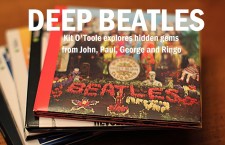On October 9, 1968, Paul McCartney asked engineer Ken Townshend to join him in Studio One at Abbey Road. The singer had an idea for a simple, bluesy track, and wanted to get the vocals and basic backing track (minus the drums) laid down. Thus “Why Don’t We Do It in the Road,” one of the White Album’s raunchiest and shortest tracks, was born, along with some subsequent controversy.
During the late stages of the Beatles White Album sessions, McCartney improvised the rocker, and elected to enter the studio by himself to record the track. He laid down five takes, which began with acoustic guitar and McCartney’s vocals. Originally he sang in a subdued style, gradually escalating to the screaming technique present on the final version. By take five, he decided to stick with the raucous vocalization throughout the track. This early version, which features McCartney thumping his guitar to create a beat, later surfaced on the Anthology 3 compilation. Once take five was completed, Paul McCartney overdubbed the piano section.
The next day, McCartney and Townshend resumed work on the track while John Lennon and George Harrison were overseeing the string overdubs for “Glass Onion” and “Piggies.” After completing additional vocals and adding handclaps, lead guitar and bass, McCartney asked Ringo Starr to join him in the studio to lay down the drum track and more handclaps.
The origin of the simple but risqué lyrics derives from the Beatles India retreat. Paul McCartney explained to author Barry Miles in Many Years from Now that he was inspired to write the lyrics by watching two monkeys, um, coupling. While sitting on a rooftop meditating, McCartney witnessed a male monkey suddenly hop on a female’s back; after a few seconds, the two separated as if nothing had happened. “And I thought, bloody hell, that puts it all into a cocked hat. That’s how simple the act of procreation is, this bloody monkey just hopping on and hopping off. There is an urge, they do it, and it’s done with. And it’s that simple. We have horrendous problems with it, and yet animals don’t,” he said. By posing the question in the song’s title, McCartney explained, “the answer is we’re civilized and we don’t. But the song was just to pose that question. ‘Why Don’t We Do It In The Road?’ was a primitive statement to do with sex or to do with freedom.”
Years later, the song would engender controversy not due to its subject matter, but because Paul McCartney chose to record it without most of his bandmates. In 1972, Lennon deemed “Why Don’t We Do It in the Road?” “one of [Paul’s] best.” However, in one of his last interviews, Lennon admitted feeling hurt that McCartney did not include him in the recording.
“He even recorded it by himself in another room. That’s how it was getting in those days. We came in, and he’d made the whole record. Him drumming, him playing the piano, him singing,” he told Playboy. “I enjoyed the track. Still I can’t speak for George, but I was always hurt when Paul would knock something off without involving us. But that’s just the way it was then.”
McCartney defended his actions in the updated edition of Hunter Davies’ Beatles biography. “There’s only one incident I can think of, which John has publicly mentioned. It was when I went off with Ringo and did ‘Why Don’t We Do It In The Road.’ It wasn’t a deliberate thing, John and George were tied up finishing something, and me and Ringo were free, just hanging around, so I said to Ringo, ‘Let’s go and do this,’” he said. “I did hear John some time later singing it. He liked the song, and I suppose he wanted to do it with me. It was a very John sort of song anyway. That’s why he liked it, I suppose. It was very John, the idea of it, not me. I wrote it as a ricochet off John.”
To underscore his point, Paul McCartney described how John Lennon recorded “Revolution 9” and “Julia” without any band involvement. Even Ringo Starr weighed in on the debate, claiming in Anthology that the Beatles did not always record with the entire band. “The Ballad of John and Yoko” features only Lennon and McCartney, and Starr stated the no one had a problem with that session.
Regardless of the controversies, “Why Don’t We Do It in the Road?” harkens back to the Beatles R&B roots. McCartney’s gritty lead vocals emulate Fats Domino and Little Richard with a touch of Chicago blues, very similar in style to the 1968 single “Lady Madonna.” The opening drums and handclaps establish a thudding beat that introduces the racy song title. As McCartney’s voice rises in volume and intensity — climaxing in falsetto — McCartney’s guitar, bass, and keyboards enhance the rollicking atmosphere but never overwhelm the true lead instrument: Paul McCartney’s voice.
“Why Don’t We Do It in the Road” may appear as an inconsequential blues jam, but it previews the classic Abbey Road workout “Oh! Darling” and demonstrates that the Beatles never neglected their first love: American R&B. The lyrics may have been inspired by copulating monkeys, but McCartney’s raw vocal performance makes the track a White Album standout.
- How John Lennon Came Roaring Back on the Beatles’ White Album - November 22, 2023
- Five ‘With the Beatles’ Deep Cuts That Illustrate Their Lasting Debt to R&B - November 20, 2023
- Five Must-Hear Deep Cuts from the Beatles’ ‘Past Masters’ - March 7, 2023


